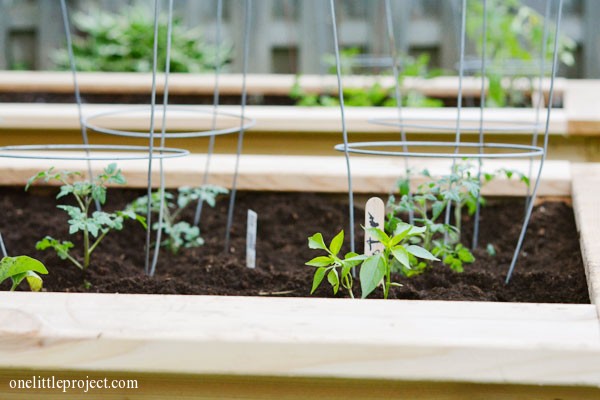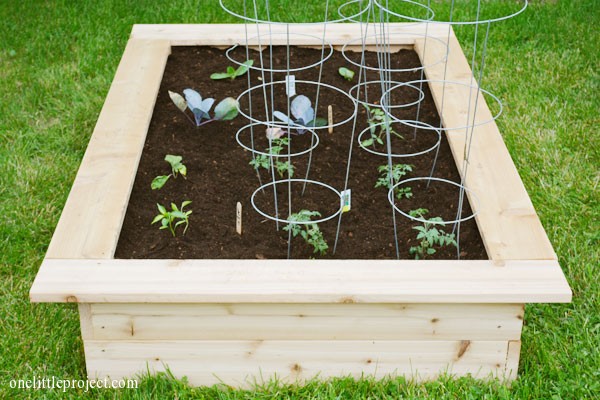It’s so much fun to be able to watch vegetables grow and to actually produce your own delicious and nutritious veggies each year! Kids seem to LOVE going to the plants in the late summer and eating tomatoes right off the vine. It’s definitely a rewarding hobby. Here are my top ten tips for how to start a vegetable garden:

How to start a vegetable garden
1. Start small, and work your way up (or down)
You don’t need to have a giant vegetable garden to grow your own vegetables. In fact, small spaces work just fine for most of us! We all have busy lives, and there just isn’t enough time to plant and maintain a giant garden. If you only want to plant a 4ft x 4ft garden, that is totally acceptable! Be reasonable in your expectations, and don’t let the work of clearing out the grass from a large part of your yard hold you back. You can even start with one or two tomato plants in containers on your patio if that’s all the time and energy you have!
2. Decide between a raised bed or planting in the ground
Tearing out the grass from a large part of your yard is a LOT of work! So be prepared for the effort it’s going to take if you decide to go that route. Ever since I heard about Square Foot Gardening I’m totally sold on raised garden beds! For starters, they look very neat and tidy in the backyard (especially if you have a small, city backyard). Secondly, you can prepare a perfect mixture of soil that the plants will thrive in. Plus, being raised up, it makes weeding and harvesting your vegetables way easier on your back! You can check out my tutorial for how to make a garden box here.
3. Choose an area that gets at least 6 hours of sun, preferably 8 hours
This is probably THE most important tip. Don’t plant your garden in a shady area. It just won’t work well. The more sun, the better, but as long as you can find a spot that has at least 6 hours of sunshine a day your vegetable garden should grow fairly well.
4. Choose a location that the hose or sprinkler can reach
The sun is really going to dry out your garden. Don’t plant it somewhere where you have to be hauling buckets and buckets of water to keep the soil moist. Make sure the hose or at least the sprinkler will reach the area. Vegetable gardens need at least 1″ of water a week, depending on how much the sun dries them out. A nice deep soaking with the garden hose is way better than using a watering can to only moisten the top layer. You will not be able to give your garden the water it needs with a watering can.
5. Make sure you have waited until risk of frost is gone
This will depend on where you live. You can search “Frost Dates for Your City Here” to find out when it’s safe to plant. But a better plan would be to ask your local garden center. They’ll have all the planting date information you need. Vegetables don’t like frost. Period.
6. Choose vegetables that you are actually going to eat
This one seems obvious, but so often it seems that people have piles of vegetables to give away (or throw away) that they just can’t eat. Don’t plant 4 zucchini plants unless you REALLY love zucchini. Don’t plant radishes if you just aren’t that into eating them. Avoid squash if it’s an autumn vegetable you only buy from the grocery store once or twice each year. Don’t go crazy with planting herbs if you have no idea what to do with them. Think about what your family loves to eat, and try to focus on growing those.
7. Choose vegetables that will actually grow
I find that cherry tomatoes are always a fairly safe bet, even for beginners who might neglect their garden. Even carrots, onions and parsley are pretty fool proof, even for the laziest gardener. I always have a fair bit of luck with larger tomatoes (not giant ones, maybe roma sized), but large tomatoes seem to be prone to disease, so they don’t always turn out well. I have never had much luck with growing red or green peppers – maybe it’s my climate, but they never seem to turn out. Talk to your garden center about plants that thrive in your area with the least amount of attention.
8. Prepare your soil
If you are planting in a raised box you have to do this anyway. Your soil should be high in nutrients and drain well. If you are planting in the ground, make sure you add a few bags of compost to the soil each year to make sure the plants have enough nutrients to grow. For raised boxes, use a mixture of compost, top soil and peat moss. When you are more than a beginner, you might want to read up on soil mixtures, but that’s enough info to get you going.
9. Get the right tools
You really don’t need many gardening tools. A shovel (mostly for when you are starting your garden), a garden trowel, a watering can, and gardening gloves are the only tools you’ll need to start. There are plenty more tools and accessories that might make things easier (gardening stool or a weeding tool, for example), but they really aren’t necessary to start with. You can grow your collection of gardening tools as time goes on.
10. Ask for help.
Don’t be afraid to ask for help. Ask lots of question at the garden center. Ask your friends (or even in the forums) which vegetables have worked well for them in the past. If you have time, do a few Google searches, or take out a book from the library. There are also easy video courses about vegetable gardening if you’d rather sit back and watch movies to learn everything you need to know to get started. You don’t need to spend hours researching, but knowledge will definitely make you more successful.
Don’t feel like you have to follow the rules – just have fun!
The vegetable garden police are not going to come after you if you don’t follow the gardening rules. You may not get the most out of your harvest, but that really isn’t the end of the world! If you don’t have time to fertilize, don’t beat yourself up about it. If you want to plant things closer together than the directions recommend, just pick up a copy of Square Foot Gardening and set your mind at ease that your plants will still grow and produce. If things don’t grow as well as you like, you can try something different next year. You are doing this for fun, so keep it enjoyable!

Source : onelittleproject.com
Read more...
Post a Comment
Post a Comment